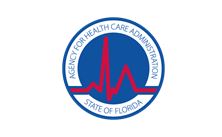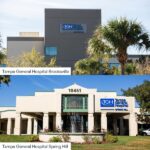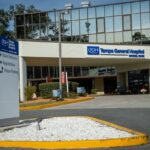Collaborative spearheads enhancements to cancer research and care
JUPITER, Fla – On Wednesday, May 24, 2023 members of the Florida Cancer Connect Collaborative gathered at the Herbert Wertheim UF Scripps Institute for Biomedical Innovation & Technology to release new cancer materials and consider the next steps for cancer innovation in Florida. The Collaborative also highlighted findings on female breast cancer from the recent call for cancer recurrence data. To view the Florida Cancer Report, click here.
The Collaborative’s recommendations for next steps in cancer innovation include removing barriers to utilizing biometric data, which better allows researchers and physicians to test for genes, proteins and other biomarkers that can guide treatment and create new cancer breakthroughs. In recent years, biometric cancer testing has been used to look for genes, proteins, and other biomarkers in the body that can give health care professionals information on cancer. Each individual battling cancer has a unique pattern of biomarkers that can affect how cancer treatment works. The Collaborative’s goal is to remove any barriers that curb biomarker testing access.
“The Cancer Connect Collaborative continues to charge forward and take unprecedented actions to further cancer research in Florida,” said Agency for Health Care Administration Secretary Jason Weida. “The initial analysis of second cancer data highlights insights into female breast cancer that researchers can use to bring their findings on care to modern day. There is no reason for researchers to be using outdated information when our state’s world-class cancer centers have the ability to go beyond what has been done before, ultimately saving lives.”
“The First Lady’s Cancer Connect Collaborative has been a tremendous step toward addressing gaps in the fight against cancer,” said State Surgeon General Dr. Joseph Ladapo. “Our cancer care efforts should not be siloed to any single organization, agency, or institution. This Collaborative – and the progress being made – is a resolute indication that, together, we can accomplish this critical mission.”
“While we continue to work together to broaden and strengthen our cancer data collection and collaboration, we must also continue to encourage Floridians to obtain routine cancer screening to further enhance early detection,” said Florida Department of Health Deputy Secretary Dr. Kenneth Scheppke. “Under the First Lady’s leadership, the Collaborative is making it easier for Floridians to understand their risks so that they’re empowered with the tools they need to be cancer free.”
Florida Cancer Report Key Takeaways
The Florida Cancer Report gives insight into trends for the most common cancers, highlights screening and prevention measures, and details the history of cancer research and care in Florida. Cancer is easiest to treat when caught early, and the report describes common symptoms to look for broken down by age, gender, and other demographics. Self-screening can be intimidating but is important to catch cancer in its early stages. At-home screenings and signs and symptoms for various cancers are detailed in the report.
The report provides the public information about the top five most frequently diagnosed cancers in Florida: which include breast, lung, prostate, colorectal and skin cancers. Since 2017, these top five cancers have accounted for just over half of all cancer diagnoses (50.3%) in Florida.
The report recognizes the unfortunate increase in cancer trends among younger populations. Since 1990, age-adjusted cancer rates have increased between 2-4 percent annually in most countries in people 30 and younger. In Florida, researchers have seen this trend in the past 10 years. Specific cancers were found to have increased among younger individuals, ages 20-39, over the past 10 years in Florida, including breast cancer, colon cancer, non-Hodgkin lymphoma, and leukemia. The efforts of the Collaborative strive to decrease the rates of cancer among young, healthy individuals, among other populations, by increasing awareness of prevention and self-screening techniques.
Florida is the first state in the nation to collect population-level cancer recurrence data and continues to collect and assess patient outcome data. Through a Florida Department of Health analysis of breast cancer data, it has been found that among Florida women who were diagnosed with breast cancer between 2011 and 2015, 12.4%, or nearly ten thousand individuals, developed a second cancer within 5 years.
The report highlights that most of the common cancers are detected in the early stages, increasing a person’s chance of survival. The average number of cancer cases annually in Florida from 2016-2020 was nearly 130,000. Cancer remains the second leading cause of death in Florida, after heart disease and we must innovate cancer best practices to save lives.
For more information on the Florida Cancer Connect Collaborative initiative, visit FLCancerConnect.com/Collaborative.
The Agency for Health Care Administration is committed to better health care for all Floridians. The Agency administers Florida’s Medicaid program, licenses and regulates more than 48,000 health care facilities and 47 health plans, and publishes health care data and statistics at www.FloridaHealthFinder.gov. Additional information about Agency initiatives is available via Facebook (AHCAFlorida) and Twitter (@AHCA_FL).




























